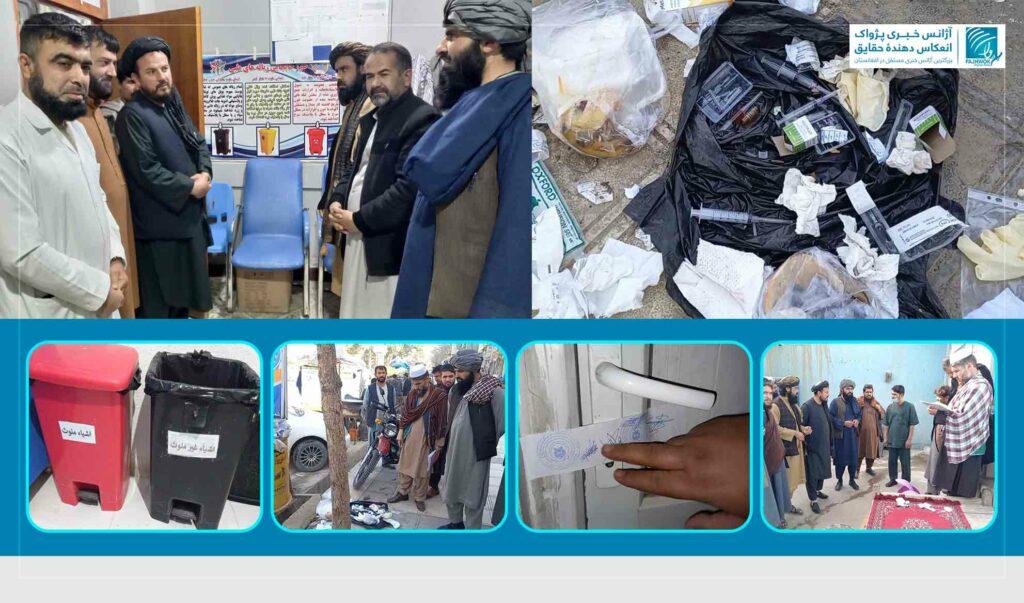
MAIMANA (Pajhwok): Some residents of Maimana City, the capital of northern Faryab, complain about improper disposal of medical waste by health centers, fearing it risks instigating a serious threat to the environment and public health. However, officials claim they have controlled this issue by up to 70 percent. According to them, some health centers, laboratories, and clinics throw hazardous medical waste in trash bins or along roadsides, which causes environmental pollution and increases the spread of diseases in the community.
The head of the Environmental Protection Department in Faryab says that after the formation of a provincial committee, 60 to 70 percent of healthcare waste has been controlled, and several health centers have been advised and sealed. Mohammad Naseem, a resident of Maimana, says some health centers and clinics throw blood-contaminated and infectious waste into municipal trashcans, which is very dangerous. He added that he has often seen poor individuals and children searching for and collecting bottles, papers, and other items from the garbage, exposing themselves and their families to various diseases from the medical waste present.

Sakhi Murad, head of cleanliness section in Municipality, acknowledged that some health centers and doctors disposed of their medical waste unsafely out in the open in municipality’s trash bins, which has repeatedly caused injuries to cleaning staff from needles and sharp glasses. However, the cleaning director said that for several months, the disposal of medical waste on roads and in drains has been prevented, and those who continue to act recklessly should be legally dealt with by the authorities. Dr.
Mohammad Zarif Ayubi, owner of Ayubi Hospital, says that health centers are the primary source of diseases because additional materials such as fluids, meat, and blood are taken from most patients, and if not properly managed, they contribute to the spread of diseases. According to Ayubi, those working in health centers must manage medical waste based one guidelines of the World Health Organization and the Environmental Protection Agency. He added: “Controlling and disposing off medical waste is costly, which is beyond the capability of the private sector, and the incinerators in public hospitals are non-functional.
However, one person has been appointed with a vehicle to collect medical waste from health centers and burn it outside the city, which has helped prevent the spread of medical waste to some extent.” Fawad Masoomi, another doctor in Maimana, says that before the initiative of the Environmental Protection Directorate and the assigned committee, most health centers would throw their medical waste in rivers and drains. However, after one person with a vehicle was appointed to collect the waste, medical waste has been controlled.
He added that controlling medical waste is extremely important and failing to do so results in the spread of diseases and poses life-threatening risks to the people and even the health personnel. Qari Mohammad Ismail Ayubi, head of Faryab’s Environmental Protection Agency, says that a committee consisting of representatives from six environmental organizations, provincial authorities, the Ministry of Public Health, the municipality, agriculture, and the private sector has been formed to control, collect, and dispose of medical waste, and approximately 70 percent of the waste dumping on roads and in rivers has been prevented. Ayubi added: “Most health centers were not aware of the risks of medical waste, the spread of diseases, and how to collect, transfer, and dispose of it.
They had not followed proper management procedures and disposed of it in rivers, streets, or municipal trash bins. After several meetings, the private sector was required to appoint someone with a vehicle to collect, transfer, and dispose of the waste, which has been 60 to 70 percent effective.” He explained that medical waste includes sharp and hazardous objects, containing infectious, carcinogenic, chemical, toxic, and dangerous substances.
It is produced in health centers, blood banks, laboratories, outpatient clinics, research centers, and diagnostic facilities. Improper management of this waste creates environmental problems and affects human health. Regarding the disposal of medical waste in government hospitals, he said: “In Maimana hospital, two incinerators that dispose of waste were non-functional.
After discussions with the relevant authorities, one of the incinerators has been activated and is now burning the produced waste daily. However, parts for the other incinerator were not found, so it remains inactive.” He added that several health centers that did not follow the guidelines and disposed of waste in streets or municipal trash bins have been shut down.
He added that the appointed committee monitors health centers once a week, and if the guidelines are not followed and the centers do not have an environmental license, legal action will be taken against them. Dr. Parwiz Hamidi, the environmental health officer at the Faryab Public Health Department, says that medical waste pollutes the environment and poses risks to humans and even animals.
He said that in the past, medical waste could be seen anywhere in the city and among municipal trash bins. However, since the private sector appointed a person with a vehicle to collect medical waste, it is now collected from health centers and clinics and burned outside the city. sa/ma Views: 0.















